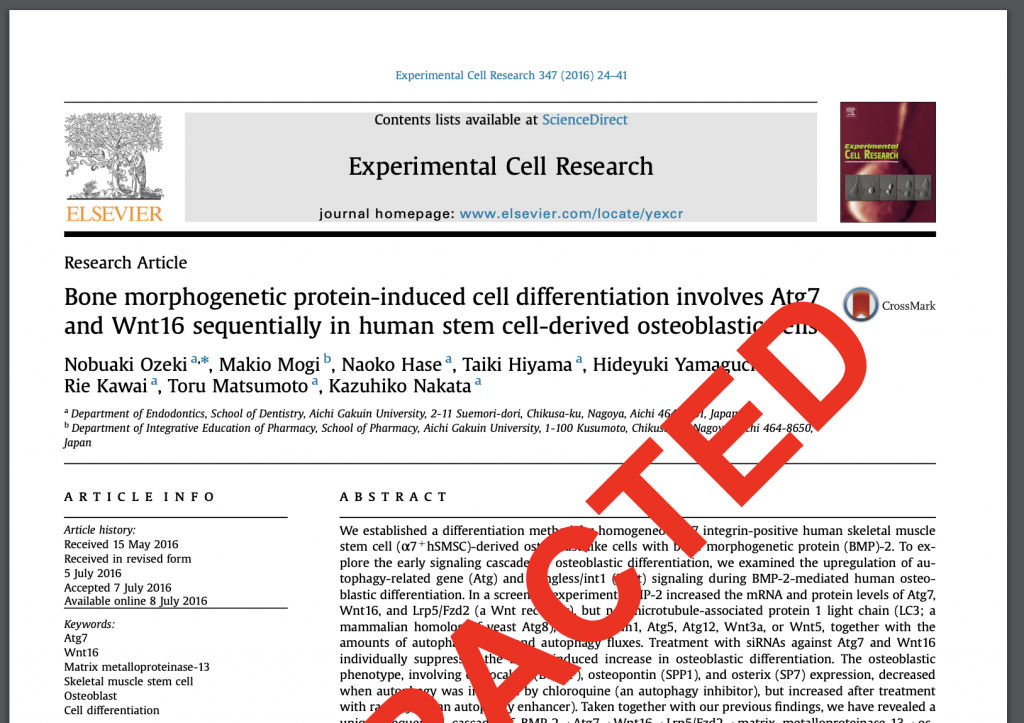
A group of researchers at Aichi Gakuin University in Nagoya, Japan, continues to lose papers for duplication of images and text from their previous work, and is now up to 19 retractions.
Please see an update on this post.
Here’s a typical notice, for “Bone morphogenetic protein-induced cell differentiation involves Atg7 and Wnt16 sequentially in human stem cell-derived osteoblastic cells,” a paper published in 2016 in Experimental Cell Research, an Elsevier title:
This article has been retracted at the request of the authors, with the approval of the Editor-in-Chief.
The journal was initially contacted by the last author to report the unavailability of the raw data of the results presented by the article and thus the unreliability of the article results.
Also, a significant amount of text has been reused from the article that the authors have previously published in Experimental Cell Research 341 (2016) 92–104 https://doi.org/10.1016/j.yexcr.2016.01.010.
All of the authors except Nobuaki Ozeki and Taiki Hiyama have agreed to retract the article. N. Ozeki left Aichi Gakuin University in March 2018 and does not respond to co-authors inquiries, while T. Hiyama left Aichi Gakuin University and could not be reached.
The authors deeply regret this error and any inconvenience it may have caused.
Altogether, eight of the group’s retractions appear in Experimental Cell Research. And the 19 papers have been cited just shy of 200 times, according to Clarivate Analytics’ Web of Science.
The group first came to our attention a year ago, when they lost two papers in PLOS ONE. That was more than a year and a half after Aichi Gakuin found that Ozeki had engaged in image manipulation, which means the new retractions took two and a half years since that report. The group lost papers earlier this year, too.
The journal’s editor has not responded to a request for comment about the delay. [See update at the end of this post.]
Elsevier also seems to have confused two of the retraction notices. The notice for “Unique proliferation response in odontoblastic cells derived from human skeletal muscle stem cells by cytokine-induced matrix metalloproteinase-3,” links to an identical retraction notice for “MicroRNA-211 and autophagy-related gene 14 signaling regulate osteoblast-like cell differentiation of human induced pluripotent stem cells.”
Update, 1230 UTC, 11/17/20: In what has become common practice at larger publisher titles, the editor, Andras Simon, forwarded our questions to an Elsevier spokesperson instead of answering himself. The spokesperson said:
The journal first became aware of an issue in May 2019 when a request was received from the author group to retract several papers. The authors also mentioned that they were awaiting the results of an ongoing investigation for data fabrication by a Aichi-Gakuin University Committee.
In accordance with COPE and Elsevier policy, retraction notices should provide a detailed explanation for retraction, which the journal expected would be available following the institutional investigation.
When the results of the investigation were not received, the journal made several attempts to contact the appropriate authorities at the Aichi-Gakuin University Committee but did not receive a response. In October 2020, with the agreement of all available authors, the journal decided to retract the papers in the absence of an institutional report.
We followed up to ask whether the journal was aware of the March 2018 report from the university. The spokesperson said:
The journal became aware of the report in January 2020 while trying to find contact details for the Aichi-Gakuin University Committee.
Our understanding is that the scope of the report is limited to a PloSOne article: doi: 10.1371/journal.pone.0083563
Like Retraction Watch? You can make a tax-deductible contribution to support our work, follow us on Twitter, like us on Facebook, add us to your RSS reader, or subscribe to our daily digest. If you find a retraction that’s not in our database, you can let us know here. For comments or feedback, email us at [email protected].